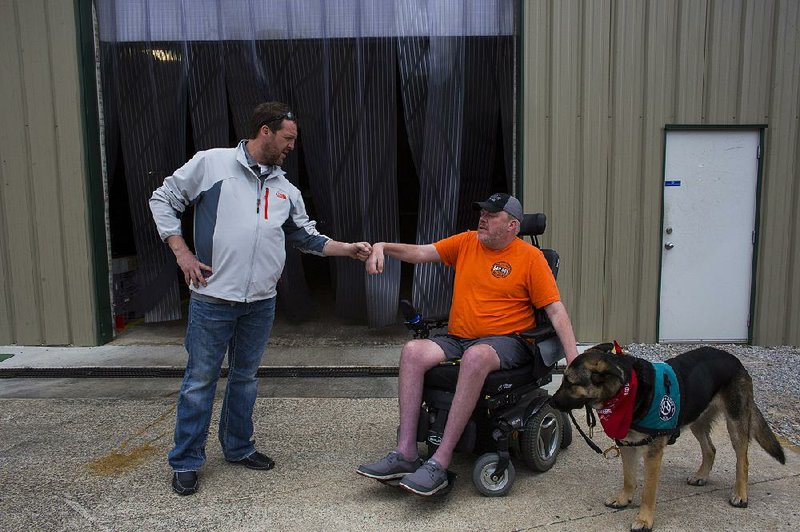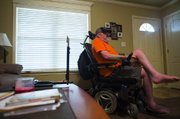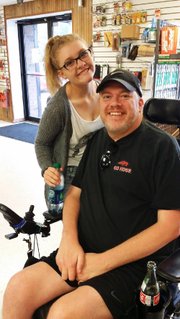BATESVILLE -- Raucous laughter bounced off the walls of the employee break room at Bad Boy Mowers.
Wes Hubbard, 44, the company's purchasing manager, rocked his chair on two legs, clutching his belly to counteract the humor-induced contractions.
He wagged a finger at Kevin Thompson, 39, his friend of nearly 25 years.
"We used to run the streets of Batesville back when we were younger. We would visit those places of ill re...," Wes trailed off before finishing the words, "ill repute." He burst into laughter. "Ah. I'm not going to say that. I don't want to tell stories on him."
"Go ahead!" Kevin muttered.
Wearing an orange Bad Boy Mowers T-shirt, a gray Bad Boy Mowers cap, and with Bad Boy Mowers stickers on his wheelchair, Kevin is a rolling advertisement for the company.
He reached down to the foam cup lodged between his knees and, using his wrists, lifted the container and straw to his lips.
Wes momentarily stilled and his smile faded as he watched his friend use hands that are curled inward and no longer move.
Kevin caught his gaze and reacted with exaggerated, comedic arm motions to drink from his cup. He altered his voice to an almost unintelligible mumble, as he skewed the sides of his mouth and changed the subject: "Sure you don't want to donate a mower? Here's your chance," he said. "Get a picture! Help a dying guy!"
Kevin has amyotrophic lateral sclerosis -- a progressive, neurodegenerative disease that is often referred to as Lou Gehrig's disease in reference to the baseball legend who died from the affliction in 1941 at the age of 37. Kevin is a tireless fundraiser and campaigner for the Little Rock nonprofit ALS in Wonderland and other organizations.
ALS has no treatment, no cure, no survivors.
The average lifespan after diagnosis is three to five years.
Kevin was diagnosed three years ago.
Life of Love
Lexie Thompson, 15, tucked her gray-sweatpants-covered legs underneath her on the couch in the family's home in Beebe.
Her blond mop of tight curls bounced as she dramatically twisted her head to the right toward her stepmother, Courtney Thompson, 34.
"It was March," Lexie said, adamantly.
"No. April," Courtney calmly countered.
Lexie pursed her lips in contemplation then threw both hands in the air.
"Anyway, I was an emotional wreck," she said. "I cried for two weeks straight."
Three years ago, she and her dad loaded into a car for one of their routine trips to Wal-Mart in Searcy. On the drive, he told her that he was being tested for ALS.
Lexie knew the acronym and what it could mean.
In 2010, she watched a favorite aunt -- Kevin's sister, Tammy Thompson Brown -- die at 37 after five years with the disease.
"I usually stayed the night with her when I was little," Lexie said. "I didn't know she was going to die. I guess I was really young and didn't process it. I just knew she was sick."
Signs of Kevin's illness began after he broke his ankle playing golf.
ALS interferes with the motor neurons that stretch from the brain to the spinal cord to the body's muscles. As the disease progresses, the muscles waste away. It snatches the ability to speak, eat, move or breathe.
According to statistics from the national ALS Association, about 90 percent of the approximately 20,000 ALS cases in the U.S. are "sporadic," meaning they randomly affect anyone, anywhere.
Familial ALS is inherited and accounts for only 10 percent of U.S. cases. A child of someone with ALS has about a 50 percent chance of contracting the disease.
"Yes," Lexie said, she is afraid she will get the disease like her aunt and father before her.
"My friends talk about their wedding day ..." Lexie trails off, then abruptly smiles. "I'm going to live anyway. Yeah!"
Courtney patted Lexie on the knee.
"She's a real tough girl," Courtney said. "She's going to have lots of babies. I want some grandkids. I want to be able to spoil them like my mom spoils her."
Step by Step
The 33-year-old man in the picture on Kevin's Facebook timeline has close-cropped blond hair, eyes hidden behind aviator sunglasses and evidence of well-defined pectoral muscles underneath a dark polo shirt.
"6 yrs ago. Boy what a terminal illness does to your looks," Kevin wrote.
Today, Kevin is confined to a wheelchair. His body's dying muscles are evident in his shrinking calves and turned-in feet; in his thin arms and curled fingers; and in his sinking chest.
He requires a mechanical lift to take him from bed to bathroom. He can neither bathe nor urinate without help.
A plaster wall in the hallway of his home has deep scratches from the light switch to the floor.
"Lights, Dyson," Kevin commanded on a recent day. The German shepherd resting beside Kevin's wheelchair sprang up and raced to the wall. With two paws, Dyson scratched from the switch to the floor, and the room went dark.
"Remote," Kevin said, and Dyson jogged to the coffee table, scooped up the television remote in his mouth, then plopped it in Kevin's lap.
Dyson is a point of pride for Kevin. The dog was trained by Arkansas Department of Correction inmates under the Little Rock nonprofit Paws 4 Hope LCA.
Dyson was 10 months old when he was selected for the program.
His "showboat" personality proved to be a challenge, and Dyson was returned by two clients before he chose Kevin, said Paws 4 Hope founder Andrea Salsberry.
"It was a God thing. Really. That's all we can say about it," Salsberry said. "It was incredible. I've never seen anything like it. There was an immediate connection."
Kevin was at the facility testing two other dogs when Dyson crawled out from the table he was hiding under and made his way straight to Kevin.
"Kevin was able to command him that day," Salsberry said. "It was phenomenal. We were all stunned. Before that we were all a little concerned about Dyson making it through the program. He was high-ranking in skills, but was a showoff. He's a perfect match for Kevin."
Kevin and Dyson are avid spokesmen for the organization and ALS fundraisers. The pair make the circuit of special appearances, doing things like throwing out the opening pitch on ALS Night at Dickey Stephens Park in North Little Rock, and being guests of honor at the ALS in Wonderland fashion show or at animal rescue fairs.
The pair attend all of Lexie's school events that include football games where she cheers or dances.
Lexie tilted her head and balled her hands into fists.
"You go out, and people stare. I want to tell them, 'Listen here. Don't judge him,'" she said, then giggles. "But I've got a good group of friends. They all go right past me and go to Dyson."
Kevin's disease progression has been slow, and the family is matter-of-fact about the future. It is what it is, is Courtney's mantra.
"It's life. God's not going to give you anything you can't deal with," Courtney said, adding that walking the journey with Kevin's sister was a blessing in disguise.
"I think it was better for us because we saw what was going to happen. We've already been through this," Courtney said. "It's not like we're going in tomorrow, and we don't know anything. We basically know. Now if we were walking in blindly, it would be different."
The family is preparing for the loss of Kevin's voice, and for feeding issues, respiratory distress and his passing. Kevin's burial plot has been chosen, although his funeral has not been planned. He is now "banking" his voice so it can be used in a communication device that he will be able to control with the gaze of his eyes.
"He still tries to do everything himself," Courtney said. "And I let him do as much as he thinks he can because I don't want to take that independence away from him. I don't want to make him feel like he can't do anything."
Kevin's home caregiver Amber Baden nodded her approval.
"It's very good for him to try to do more things for himself," she said. "Later on, we'll have to stretch his legs out and do all that stuff. His progression has been very slow though because of how active and engaged he is."
In every person, the disease progresses differently, Courtney added.
"Once it gets to the upper area of the body ...," she trailed off. "It's pretty much going fast."
From the bedroom, a hoarse voice hollers, "I'm not dead yet!"
One-stop shop
As interim director of the University of Arkansas for Medical Sciences ALS Research and Clinical Center -- the only ALS clinic in the state and one of 33 nationwide -- Dr. John Greenfield doesn't have an office.
He rolled his chair farther under the table and squeezed his shoulders together as members of the medical staff weaved in and out of "Command Central" at the clinic in Little Rock.
Greenfield pointed to a white dry-erase board on the wall. Patient names are listed in one column, and different care providers are listed in another -- neurologist, speech therapist, occupational therapist, respiratory therapist, licensed dietitian, social worker, MDA representative and equipment vendor.
The clinic -- sponsored by a quarterly grant from the Arkansas Muscular Dystrophy Association -- is open from 9 a.m. to 5 p.m. every Monday and caters to about eight ALS patients each week.
Greenfield, chairman of the UAMS neurology department, said the clinic is a powerful tool.
"It's very advantageous for them because it's one-stop shopping," he said of the patients.
The patients' every need is met, and problems are caught early.
"Our patients in wheelchairs, the MDA rep will fix whatever problems you have or figure out what is in order for the patient next," Greenfield said. "The respiratory therapist looks to see if they need to move towards noninvasive ventilation. They see the doctor, the speech and swallow specialists. Everything is all together."
Kara Evans, family support and clinical care coordinator for the Arkansas Muscular Dystrophy Association, coordinates the clinic and meets with each patient to address individual needs.
"Our clinics are certainly one of our biggest bragging rights," she said.
Kevin and Dyson, she said, are a joy for her.
"They're amazing," she said. "He's such a great guy."
Kevin said his trips to the clinic -- typically every three months -- can make for a long day. Taking numerous trips to different providers would be even more draining, physically as well as financially, he said.
Each visit, a patient's functional ALS score is determined using a two-page worksheet that rates from zero to 4 points abilities in about 15 markers like speech or cutting food.
While the worksheet and score are available to the patient, they are given only if the patient requests them, Greenfield said.
"The scores typically go down each visit," he said. "Rarely does it show improvement."
Kevin said he used to ask for his functional ALS score each visit, but doesn't anymore.
"I just track my breathing now," he said.
His clinic visit last week "went good," he said.
"I gained 5 pounds, and breathing went up 5 percent."
A distraction
Thousands of tiny, lighted dots were scattered across the wall-sized electronic U.S. map in the shipping department at Bad Boy Mowers.
Kevin motioned with his wrist toward Kentucky.
"There are about 24 more dots now than when we came in earlier," he said.
Kevin spends about five hours, two days a week at the lawn-mower plant. He's an unpaid consultant of sorts. His previous experience in freight transportation is valuable expertise for the company.
And the friendship and mental challenge offer Kevin a powerful distraction.
"I love it. When I'm at home, I take four to five pain pills. Here, I take a lot less because my mind is constantly going," Kevin said.
Parts manager Jeff Tosh, 32, said Kevin's contribution is invaluable.
"I learn a lot from him professionally," Jeff said. "He's an inspiration to me. When he does come up, we have a great time together. He keeps me laughing and on my toes."
Wes said it's heartening to see Kevin so full of life.
"Initially when you hear about something like that, it's pretty heartbreaking," Wes said. "Then you do what you can to help, as little as it may be. Whether it's a text message or hanging out and talking. Your heart wants to break for him because it's such a cruel disease."
Kevin interrupted with a reassuring grunt.
"When I'm at home I think about all this stuff," Kevin said, motioning to the wheelchair. "Here, I don't feel the muscle pain as much. I feel like this has slowed down my progression. It makes me feel like I'm being utilized."
With a flip of his wrist, Kevin sent the wheelchair into a spin, then splayed his arms open wide. He nodded down to the Bad Boy Mowers logo on his chest.
"Besides, I get these cool shirts."
SundayMonday on 04/17/2016


